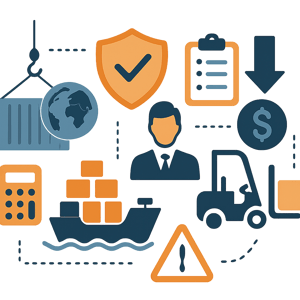innovations during the drug
discovery phase.
We take a personalized and integrated approach to help our clients position their pipelines and companies for success offering a full range of development and commercialization services.
We are Halloran, a life science consulting firm, partnering to enrich your product development and business growth. We propel your organization further; positively impacting the health and wellbeing of patients around the world.

As global clinical development continues to expand across borders, the interplay between trade policy, regulatory requirements, and operational logistics has become an increasingly critical—and costly—consideration for clinical development sponsors. Recent shifts in U.S. tariff structures and geopolitical dynamics are reshaping how biopharma organizations plan and execute clinical trials spanning continents.
What once seemed like a straightforward supply chain process now carries significant strategic and financial implications. Understanding these nuances is essential to de-risk programs and protect trial timelines and budgets.
Leaders on this topic, Joe Ivan, Head of Supply Chain Services at DSI, and Trine Stougaard Bak, Director, Clinical Science & Trial Operations at Pharma IT — both PLG affiliate companies – shared their insights at our recent Halloran and PLG-produced CORE event. Their fireside chat, Building Resilient Clinical Supply Strategies in a Shifting Geopolitical Landscape, offered insights unique to prior CORE events.
The Tariff Landscape: A Budget Risk, not a Quality Risk
When importing materials into the U.S., sponsors face potential tariffs, depending on the product classification and country of origin. For many European-based biotechs seeking to save costs by manufacturing overseas, these tariffs can quickly erode perceived savings.
If the product is already branded or falls under specific patent protection categories, the classification can fall into a gray area. To mitigate the uncertainty, organizations must plan for tariffs as a budget risk—not as a threat to quality or regulatory compliance, but as a financial variable that must be modeled early.
Tariffs are collected by U.S. Customs and Border Protection (CBP), which operates under the Department of Homeland Security. CBP acts as the “tax collector” for these imports, and once a tariff is imposed, sponsors have limited recourse other than appealing through lengthy federal processes. In practical terms, it functions much like tax filing—credits may be available later, but the upfront cost is unavoidable.
Preparing for Port and Clearance Challenges
While tariffs draw attention, logistical friction points such as port congestion and document accuracy can also delay importation. In recent months, delays that used to take two days have stretched to three or more due to port congestion. Although this may not materially affect trial start-up, it reinforces the importance of front-end preparation.
Well-prepared sponsors and Clinical Research Organizations (CROs) ensure that:
When executed correctly, most imports clear automatically through the system. But even minor coding errors—such as mismatched FDA and USDA product codes—can trigger detentions or improper classification. Precision in import documentation is therefore non-negotiable.
The Cost Burden for Small and Mid-Sized Biotechs
For large pharmaceutical companies, tariff-related expenses and customs complexities are often absorbed into broader operational budgets. However, for smaller biotech firms—especially those headquartered outside the U.S.—these costs can be prohibitive.
A European sponsor planning to conduct an Investigational New Drug (IND) trial in the U.S. may face:
These realities are forcing some early-stage sponsors to reconsider U.S. trial execution altogether. While FDA expectations still favor including U.S. patients in pivotal studies, the cost of compliance and importation is prompting some to pause or delay entry into the U.S. market.
Regulatory Interdependencies: Coding, Harmonization, and Risk of Detention
The intersection between the FDA and USDA creates another layer of complexity. Both agencies operate under the Department of Health and Human Services, yet their regulatory frameworks don’t always align.
For investigational drugs, proper harmonization between:
is crucial. Failure to match these codes accurately can result in detention at the port of entry. If the IND is not yet active or the labeling is incomplete, CBP may flag the shipment for misbranding—an error that can halt a program and cause significant reputational risk.
The Strategic Trade-Off: U.S. Market Access vs. Global Efficiency
Despite the challenges, sponsors still need to weigh the long-term benefits of conducting trials in the U.S. The FDA remains the gold standard for global regulatory approval, and U.S.-based data is often essential for future commercialization.
However, current trade policies could temporarily dampen new product launches and reduce clinical trial activity within the U.S. Large pharma companies are responding by building new manufacturing facilities domestically, while smaller firms are seeking alternative geographies for early development.
The outcome may be a short-term contraction in U.S. clinical activity, followed by a rebound once political and economic forces stabilize.
Contingency Planning: Control What You Can Control
As one supply chain expert summarized, “You can control what you can control.” Tariffs and trade policy sit outside a sponsor’s influence, but proactive planning can mitigate much of the associated risk.
Best practices include:
Global clinical development has always required precision and foresight—but in today’s environment, it also demands trade literacy. Tariffs, import codes, and agency interdependencies may seem like administrative details, yet they can define the success or failure of a trial’s operational execution.
For sponsors seeking to enter or sustain a presence in the U.S. market, the lesson is clear: plan for tariffs, invest in expertise, and treat importation as a strategic pillar—not an afterthought—of clinical development.
Need to talk with the right supply chain expert? Contact our team.